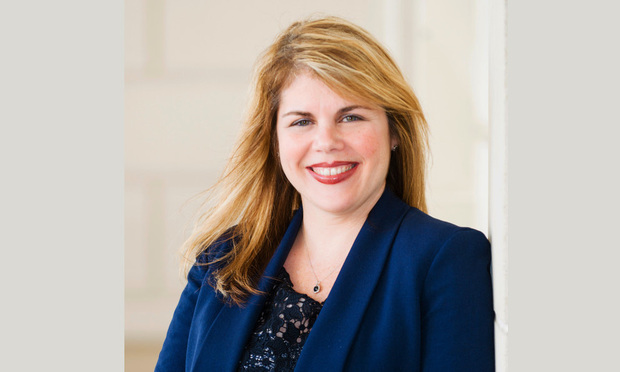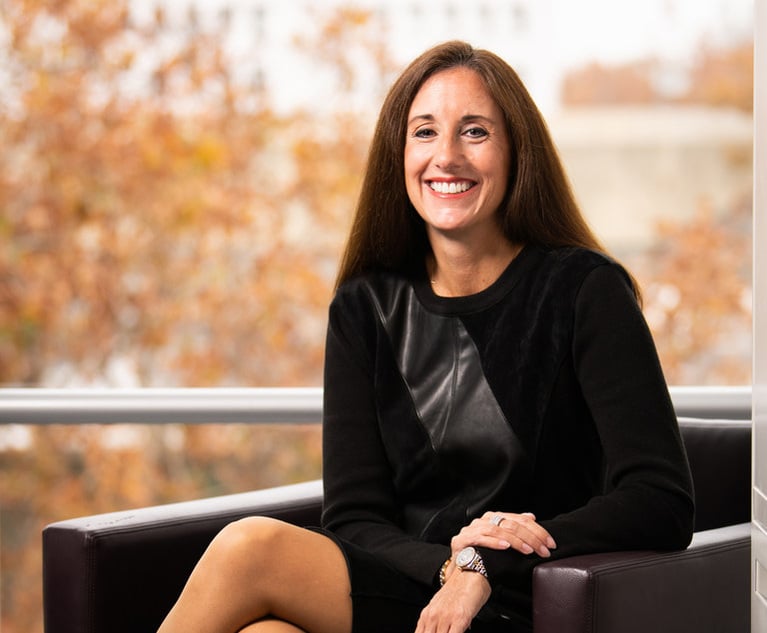Hispanic National Bar Association to Focus on Ensuring Integrity of 2020 Election
In a Q&A, incoming HNBA President Irene Oria spoke about the election, diversity in the law, the Helms-Burton Act and the importance of unity in the Latino community.
October 04, 2019 at 01:18 PM
5 minute read
 Irene Oria, incoming president of the Hispanic National Bar Association
Irene Oria, incoming president of the Hispanic National Bar Association
In late September, Miami-based FisherBroyles partner Irene Oria was sworn in as the incoming president of the Hispanic National Bar Association. Oria first joined the Hispanic Bar in law school in the 1990s and served as the organization's Florida president in 2015. She is a commercial litigator who has recently focused her practice on class-action defense in the financial services and insurance sector.
The Daily Business Review spoke with her about her upcoming priorities, which include working to ensure the 2020 United States election is secure and educating and discussing the controversial Helms-Burton litigation making its way through the courts.
The conversation has been edited lightly for clarity.
Let's start this conversation broadly: What are your biggest priorities coming into the presidency?
Obviously, I'm going to be president in 2020, which is a consequential election year. And so I will have robust nonpartisan 2020 election initiatives to deploy our HNBA members knowledge and skills, including our Spanish-speaking skills, to ensure the integrity and security of the upcoming election — basically doing anything we can do as lawyers, from poll-working to poll-closing operations to legal phone banks to voter registration drives to voter protection efforts.
It's also important to me, especially in a year like this, that we bring our community together and that we're representing everybody in our community. I've noticed we've had a lot of programming directed to law firm attorneys — medium-sized and big law — as well as our corporate in-house attorneys, and not as many initiatives directed to our solo/small firm attorneys, government attorneys and nonprofit attorneys. It is important to me in a year like this to have programming and new initiatives that are targeted to help them because they represent over 75% of the Latino attorneys in the U.S. We need to engage them more than we are, and we need to make sure we're giving them the training they need to advance their careers. The government and public interest attorneys are at the frontline, battling the legal issues that are so important to our community.
In your inaugural speech, you said: "All of us — Mexicans, Puerto Ricans, Cubans, Guatemalans, Dominicans, Hondurans, and on and on — we've all been victims of disparagement and stereotypes lodged by non-Latinos and Latinos alike, based on our particular country conditions and life circumstances. All of that needs to stop." What sort of in-fighting were you referencing? And why highlight this divide in particular?
I think it's important to bring our community together. I think you can just turn on the TV and hear divisive comments about our community. Usually, it's coming from non-Latinos or non-Hispanics. But there have been times when we attack each other, and we can't do that. We have to come together as a community in order to fight our common enemies. As far as diversity and inclusion, which is obviously what HNBA is focused on, we have to come together in order for us to have a way to represent everybody in our community regardless of what country they come from, what school they went to or what city they live in.
Speaking of diversity, how would you characterize the inroads Hispanics have made into the law?
We've certainly made some inroads, but we have a long way to go. In many ways, we're still behind other minority groups. For example, in the corporate sector, as far as Fortune 500 or Fortune 100 GCs, there are fewer Hispanics in those roles than Black or Asian Americans. We have had times where we've been doing better. In recent years we've declined again. So we have to do better.
In law firms, we're doing a little better than we were before but we're still underrepresented, especially in Big Law, and especially Latinas. So there's so much work to be done. In government and public interest law, we do have a lot of attorneys but as I said, we have to be more vigilant and make sure we support our attorneys going into those sectors.
I'm sure you've noticed the recent flurry of movement regarding Helms-Burton. What do you think of the litigation and law?
That litigation gets back to very complex issues that we foresee will be the subject of litigation for many years to come. It's relatively new, given that this the first time the Act has been allowed to take effect since its 1996 passage. There's a lack of precedent and the courts will have to interpret the Act and the exemptions to the Act and how this may impact foreign companies doing business in Cuba.
The issues being litigated are obviously very sensitive and complicated and involve private litigants, thus the HNBA has not taken an official position on the interpretation or the implementation of the Act.
What we do is we focus on providing education and discussion. An example of that was we had a plenary at a Miami conference in 2017. We had a plenary on the future of U.S.-Cuba relations, which included discussion of the Helms-Burton Act. And we've had similar events in different regions, including Miami in the last couple of years.
We also had a Cuba task force, which is now called the Special Committee on Cuba. Among other things, the committee addresses diplomatic and humanitarian concerns, analyzing the repercussions of the Helms-Burton Act. So we certainly look at these issues but we do not take an official position on litigation, pending litigation or on the legislation itself.
Similar Stories:
This content has been archived. It is available through our partners, LexisNexis® and Bloomberg Law.
To view this content, please continue to their sites.
Not a Lexis Subscriber?
Subscribe Now
Not a Bloomberg Law Subscriber?
Subscribe Now
NOT FOR REPRINT
© 2025 ALM Global, LLC, All Rights Reserved. Request academic re-use from www.copyright.com. All other uses, submit a request to [email protected]. For more information visit Asset & Logo Licensing.
You Might Like
View All
EB-5 Rebounds After a Rocky Year: Challenges of 2024 Lay Groundwork for a Booming 2025

Greenberg Traurig, Holland & Knight Leaders Expect AI Investments to Jump in 2025
5 minute read
Leveraging the Power of Local Chambers of Commerce: A Second-Career Lawyer’s Guide to Building a Thriving Practice
5 minute readTrending Stories
- 1South Florida Attorney Charged With Aggravated Battery After Incident in Prime Rib Line
- 2'A Death Sentence for TikTok'?: Litigators and Experts Weigh Impact of Potential Ban on Creators and Data Privacy
- 3Bribery Case Against Former Lt. Gov. Brian Benjamin Is Dropped
- 4‘Extremely Disturbing’: AI Firms Face Class Action by ‘Taskers’ Exposed to Traumatic Content
- 5State Appeals Court Revives BraunHagey Lawsuit Alleging $4.2M Unlawful Wire to China
Who Got The Work
J. Brugh Lower of Gibbons has entered an appearance for industrial equipment supplier Devco Corporation in a pending trademark infringement lawsuit. The suit, accusing the defendant of selling knock-off Graco products, was filed Dec. 18 in New Jersey District Court by Rivkin Radler on behalf of Graco Inc. and Graco Minnesota. The case, assigned to U.S. District Judge Zahid N. Quraishi, is 3:24-cv-11294, Graco Inc. et al v. Devco Corporation.
Who Got The Work
Rebecca Maller-Stein and Kent A. Yalowitz of Arnold & Porter Kaye Scholer have entered their appearances for Hanaco Venture Capital and its executives, Lior Prosor and David Frankel, in a pending securities lawsuit. The action, filed on Dec. 24 in New York Southern District Court by Zell, Aron & Co. on behalf of Goldeneye Advisors, accuses the defendants of negligently and fraudulently managing the plaintiff's $1 million investment. The case, assigned to U.S. District Judge Vernon S. Broderick, is 1:24-cv-09918, Goldeneye Advisors, LLC v. Hanaco Venture Capital, Ltd. et al.
Who Got The Work
Attorneys from A&O Shearman has stepped in as defense counsel for Toronto-Dominion Bank and other defendants in a pending securities class action. The suit, filed Dec. 11 in New York Southern District Court by Bleichmar Fonti & Auld, accuses the defendants of concealing the bank's 'pervasive' deficiencies in regards to its compliance with the Bank Secrecy Act and the quality of its anti-money laundering controls. The case, assigned to U.S. District Judge Arun Subramanian, is 1:24-cv-09445, Gonzalez v. The Toronto-Dominion Bank et al.
Who Got The Work
Crown Castle International, a Pennsylvania company providing shared communications infrastructure, has turned to Luke D. Wolf of Gordon Rees Scully Mansukhani to fend off a pending breach-of-contract lawsuit. The court action, filed Nov. 25 in Michigan Eastern District Court by Hooper Hathaway PC on behalf of The Town Residences LLC, accuses Crown Castle of failing to transfer approximately $30,000 in utility payments from T-Mobile in breach of a roof-top lease and assignment agreement. The case, assigned to U.S. District Judge Susan K. Declercq, is 2:24-cv-13131, The Town Residences LLC v. T-Mobile US, Inc. et al.
Who Got The Work
Wilfred P. Coronato and Daniel M. Schwartz of McCarter & English have stepped in as defense counsel to Electrolux Home Products Inc. in a pending product liability lawsuit. The court action, filed Nov. 26 in New York Eastern District Court by Poulos Lopiccolo PC and Nagel Rice LLP on behalf of David Stern, alleges that the defendant's refrigerators’ drawers and shelving repeatedly break and fall apart within months after purchase. The case, assigned to U.S. District Judge Joan M. Azrack, is 2:24-cv-08204, Stern v. Electrolux Home Products, Inc.
Featured Firms
Law Offices of Gary Martin Hays & Associates, P.C.
(470) 294-1674
Law Offices of Mark E. Salomone
(857) 444-6468
Smith & Hassler
(713) 739-1250







